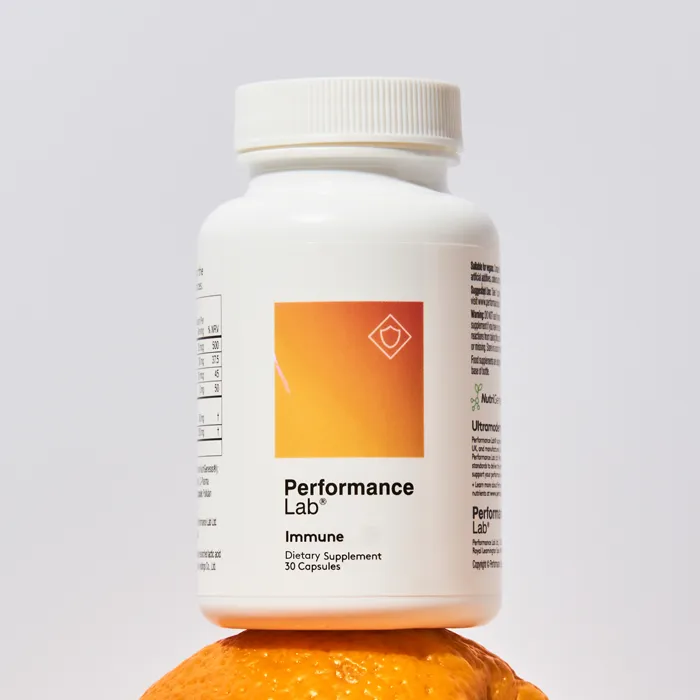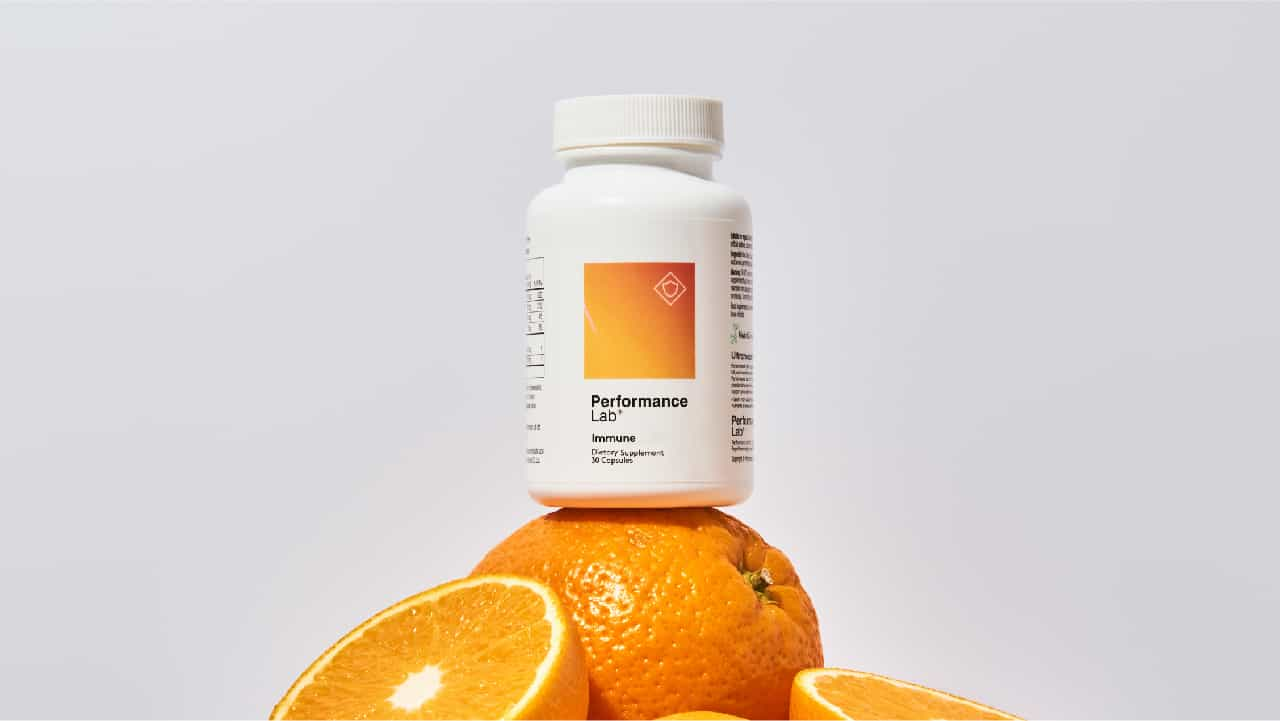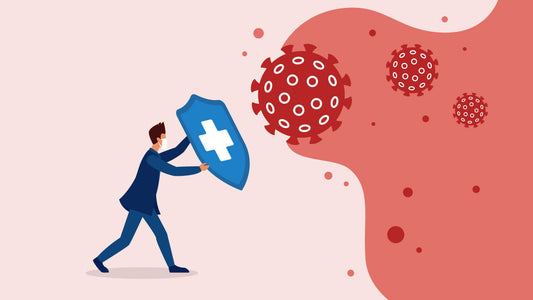From fighting free radicals to boosting your immune system... glutathione is probably the most important antioxidant you can give your body. It's easy to supplement, but are there any side effects? Let's find out...
What Is Glutathione?
Glutathione (GSH) is one of the most powerful natural antioxidants we have at our disposal. Synthesized in the liver from amino acids cysteine, glycine, and glutamic acid, you can find glutathione in every single cell in your body.
It offers strong support for the body's natural processes, including the immune system, by helping to neutralize damaging free radicals and tackle oxidative stress.
Let me put that into context for you so you can appreciate just how valuable glutathione is. If you don’t have enough of this powerful antioxidant in your system, you may be at increased risk for cancer, cardiovascular disease, diabetes, arthritis, digestive issues, and more.
Yes, it really is that important. (1, 2)
Key Takeaways
- Glutathione is the body’s master antioxidant, crucial for neutralizing free radicals, supporting the immune system, and protecting cells from oxidative stress.
- While naturally produced in the liver, levels can decline with age, stress, and poor nutrition — making supplementation beneficial for overall wellness.
- Different forms exist — oral, liposomal, topical, and IV — but oral and Setria® glutathione are best supported by research for safety and bioavailability.
- Potential side effects are generally mild (e.g., bloating or digestive upset) when taken in recommended doses; IV and unregulated forms carry higher risk.
- Choosing a high-quality supplement like Performance Lab® Immune with Setria® Glutathione can help minimize side effects while maximizing immune and cellular protection.

Glutathione Supplements
Given that glutathione is made naturally in the body, do we really need to supplement it? Possibly.
If you don't eat enough of the right foods, for example, you may not consume enough of the amino acids needed to synthesize glutathione.
At the same time, glutathione levels can be interrupted or damaged by age, stress, poor nutrition, environmental toxins and more.
So while it is produced naturally by the body, it can also be supplemented through oral, topical, or intravenous means to enhance its effects.
But are there side effects with glutathione supplementation? We're going to examine that in detail shortly, but first, let's make sure we fully understand the benefits of glutathione first...
Health Benefits of Glutathione

The roles of glutathione in the body are many and varied. They include:
Tackling Free Radicals and Oxidative Stress.
I touched on this briefly earlier, but it’s worth mentioning again. Free radicals can cause oxidative stress that damages cells, and as a potent antioxidant, glutathione can neutralize these little tricky devils.
GSH, the reduced form of glutathione, is primarily responsible for this antioxidant activity by directly scavenging free radicals and supporting cellular defense mechanisms.
It also encourages other antioxidants such as vitamins A, C and E to work harder. Oxidative stress is linked to diseases such as cancer, arthritis, nonalcoholic fatty liver disease and diabetes.
As a result, glutathione may offer cardiovascular health benefits and more. (3,4, 5)
Supporting the Immune System.
As a powerful antioxidant, glutathione is a key player in the body's immune function, potentially helping to reduce the risk of infections. It helps support both the adaptive and the innate immune systems by supporting T-cell production and influencing NK (Natural Killer) cells.
Glutathione has also been shown to help control the body's response to inflammation, preventing it from getting out of control. Which may explain why some inflammatory conditions have been linked to low levels of glutathione. (6-9)
Supporting Cognitive Function.

As an extension of the above, the brain’s high metabolic rate and oxygen consumption make it vulnerable to oxidative stress, which can lead to aging and neurodegenerative diseases like Alzheimer’s and Parkinson’s Disease.
Low levels of GSH have been linked to Parkinson’s disease, and research is exploring whether boosting GSH might help manage the condition.
Glutathione deficiency is associated with both the development and progression of Parkinson's disease, and supplementation with GSH is being explored as a potential therapeutic strategy.
Liposomal glutathione in particular can cross the blood-brain barrier and may help cognitive function and mental clarity. Protecting neural health. (10, 11)
May Help to Tackle Insulin Resistance
Insulin allows glucose into cells in order to use it for energy, helping to fuel our bodies, but when we don't respond to it the way we should, we may have insulin resistance. This means we're desensitized to it, which can lead to type 2 diabetes, cardiovascular disease, metabolic syndrome and more.
Here's the connection with glutathione - people with insulin resistance have been shown to have low levels of the antioxidant. Supplementing with glutathione, therefore, may help to prevent and even reverse this loss.
STUDY
A three-month trial of liposomal glutathione on people with type 2 diabetes demonstrated reduced levels of oxidative stress and prevented the fall of glutathione. (12, 13, 14)
Aiding Liver Health and Fatty Liver Disease
Glutathione is essential for the liver, providing it with the tools it needs to perform its all-important role as the body's detox powerhouse. Liver cells contain the highest amounts of glutathione than any other cells in the body, helping the liver to neutralize toxins before they can cause damage.
Glutathione helps by reducing oxidative stress as well as inflammation, both contributors to liver disease, including nonalcoholic fatty liver disease.
Clinical research, including double-blind, placebo-controlled studies, has found that oral glutathione may help improve liver enzyme levels, protein balance, and bilirubin in the blood. These effects are likely due to glutathione’s ability to reduce oxidative stress and protect liver cells from damage.
By neutralizing free radicals, glutathione helps maintain healthy liver function and may help slow the progression of fatty liver disease. (15, 16, 17)
Boosting Gut Health

Glutathione has been shown to help strengthen gut and digestive health, in particular the gut microbiome - the microscopic world inside our GI tract that is host to trillions of microorganisms.
We need a healthy balance between beneficial and bad bacteria to keep our systems working well - glutathione can help with this by reducing inflammation and oxidative stress, strengthening the gut lining and supporting that balance.
STUDY
A six-month trial of oral glutathione supplementation among people with type two diabetes showed significant changes in the gut microbiome. Beneficial bacteria increased, while bad bacteria decreased. (18)
And let me tell you - that isn't just a benefit for the gut and digestive health.
A whopping 70% of our immune cells just happen to be in our gut, meaning the health of our intestinal system can influence the health of our entire body.
Other Health Benefits of Glutathione include supporting DNA synthesis and protecting DNA integrity during reproduction; aiding the regular death of cells, and supporting certain enzymes. (19)
A Word about Skin Lightening

Glutathione also has a reputation as a skin lightening agent, with fans claiming that it reduces dullness, dark spots, and discoloration, promoting an even skin tone.
Studies show it may be true - temporarily.
STUDY
A three-month study of women with dark spots on their faces were given either L-glutathione or L-cysteine (one of the three amino acids needed to make glutathione) daily.
Both produced a noticeable skin-lightening effect, lightening dark spots on the face and skin on the upper forearm. Both together reduced the size of dark spots.
It may also have the potential to improve skin elasticity and reduce skin wrinkles.
The limitation
When it comes to skin lightening, other studies have proven that oral or topical glutathione only works for as long as you take it, and results may be inconsistent. (20-23)
Current evidence supporting glutathione's use for skin whitening is limited, and more research is needed to confirm its long-term safety and effectiveness. A review of available studies highlights both the potential and the limitations of glutathione for skin whitening.
Types of Glutathione Supplementation

There are several different types of glutathione supplements available, and the format you choose may influence any potential side effects, so let's examine what they are.
- Oral glutathione supplements such as tablets and capsules.
- Sublingual glutathione - taken under the tongue.
- Topical glutathione such as creams and serums.
- Inhaled glutathione.
- Liposomal glutathione - glutathione is enclosed in tiny fat-like bubbles called liposomes, designed to aid absorption. Often sold as capsules or liquid.
- Intravenous glutathione administration (IV glutathione), or injections.
- Setria Glutathione - the most bioavailable form of glutathione. As available in our top quality product, Performance Lab Immune
Side Effects of Glutathione
Research into glutathione is promising but still in its early stages. As such, there is no agreed recommended safe dosage, and some side effects might occur depending on individual response.
WebMD suggests up to 500mg per day of oral glutathione is possibly safe. Medical trials for specific uses have increased dosage to three or four times that, but this is under medical supervision and using different formats. Some studies report mild side effects or adverse reactions.
Certain side effects have been reported in clinical trials, including gastrointestinal discomfort and allergic reactions.
Participants receiving different forms of glutathione in studies have experienced varying outcomes.
Dangers of Taking Too Much Glutathione
What seems to be clear is that potential side effects of certain types of glutathione may be caused by taking too high a dose. As such, it's important to stick to the recommended dose of any product you use and not to take too much.
Here's what else we know about potential side effects of glutathione per format... (24)
Oral Glutathione
Alongside liposomal and Setria Glutathione, oral glutathione is probably the most well- tolerated form of the antioxidant supplement. Most side effects from this type of glutathione tend to be mild, and often occur at the start of supplementation and disappear when the body gets used to it.
It makes sense when you think that glutathione has the power to alter your gut microbiome. Once your gut has settled, many of the side effects tend to go away.
Mild side effects noted in clinical trials have included bloating or mild cramps, gas and/ or loose stools, potential weight gain, and flushed skin. (25, 26)
Topical Glutathione
Not a lot is known about the risks of topical glutathione, but it may cause a rash when applied to the skin in some people.
Inhaled Glutathione
Delivered directly into the lungs, this form of glutathione is typically used for respiratory conditions but may have side effects such as asthma attacks. Do not inhale if you have asthma.
IV Glutathione/ Injections and Allergic Reactions
Potentially the most risky form of glutathione. These injections are not approved by the FDA and are often unregulated. Such unregulated injections can cause allergic reactions and even organ damage. Doctors, however, are allowed to prescribe compounded glutathione off-label, as long as it comes from a reputable lab.
Precautions and Dosage
When it comes to using glutathione supplements, safety should always come first. The typical dosage for glutathione supplements ranges from 250 to 1,000 milligrams per day, but it’s wise to start with a lower dose and gradually increase only if needed.
Taking glutathione in higher amounts or for long-term use may increase the risk of adverse effects, including allergic reactions such as rash, itching, or swelling. As I mentioned, some people may also experience mild digestive discomfort, especially when first starting supplementation.
Interaction with Other Medications
It’s important to remember that glutathione supplements may cause interactions with certain medications, including blood thinners, and may affect the body’s levels of nutrients like zinc.
Before using glutathione, especially if you have a medical condition, are pregnant or breastfeeding, or are taking other medications, consult with a healthcare professional.
Individual responses to glutathione supplementation may differ, and not everyone will experience the same effects or benefits.
Monitor your health closely when taking glutathione, and discontinue use if you notice any adverse reactions. By taking these precautions, you can help ensure that your use of glutathione supports your health safely and effectively.
Importance of High-Quality Glutathione Supplements
Because the Food and Drug Administration (FDA) does not regulate dietary supplements as strictly as prescription medications, there can be significant differences in the purity, potency, and safety of glutathione supplements on the market.
This makes it essential to choose products from reputable brands that prioritize quality and transparency.
Look for glutathione supplements that have been independently tested. These third-party verifications help ensure that the supplement contains the ingredients and dosages listed on the label, and that it is free from harmful contaminants.
Our own glutathione supplement, Performance Lab Immune, is free from artificial preservatives and synthetic additives. It is also non-GMO and non-irradiated, as well as free from gluten, soy, and other allergens.
Choosing a high-quality supplement can help minimize the risk of side effects and maximize the efficacy of glutathione supplementation. Follow the recommended dosage instructions to further minimize the risk of adverse effects.
Best Glutathione Supplement
 Performance Lab Immune includes an effective but safe 250mg of Setria Glutathione, a patented version of the antioxidant designed to be highly bioavailable. Making it easy for the body to absorb and use.
Performance Lab Immune includes an effective but safe 250mg of Setria Glutathione, a patented version of the antioxidant designed to be highly bioavailable. Making it easy for the body to absorb and use.
Setria Glutathione trials have shown that it can raise blood and cell glutathione levels after supplementation over one, three and six months. Supplementation also reduced oxidative stress and doubled the effectiveness of Natural Killer immune cells. (27)
Alongside Setria Glutathione is LC-Plasma probiotic which helps to activate five different types of immune cells, alongside supporting your gut and digestive health.
It's a one-two powerful punch of support for the immune system, boosted even further with the addition of zinc, selenium, vitamin C and vitamin D3.
Take Home Thoughts
There's no denying that glutathione is hugely important for the body, helping to reduce inflammation and oxidative stress, improving liver function and enhancing our immune system.
By protecting cells from damage, it may even help to reduce the risk of chronic diseases such as heart disease, cancer, and neurodegenerative disorders.
When it comes to supplementation, choosing the right format is crucial, as is monitoring for potential side effects of glutathione and adjusting dosage as necessary. You can minimize the risk by choosing a quality product like Performance Lab Immune.
References
- Townsend, D. M., Tew, K. D., & Tapiero, H. (2003). The importance of glutathione in human disease. Biomedicine & Pharmacotherapy, 57(3–4), 145–155.
- Julius, M., Lang, C. A., Gleiberman, L., Harburg, E., DiFranceisco, W., & Schork, A. (1994). Glutathione and morbidity in a community-based sample of elderly. Journal of Clinical Epidemiology, 47(9), 1021–1026.
- Luque-Ceballos, J. C., Rodríguez-Zamora, P., López-Olivos, J. C., & Garzón, I. L. (2023). Revisiting the scavenging activity of glutathione: Free radicals diversity and reaction mechanisms. Computational and Theoretical Chemistry, 1227, 114227. https://doi.org/10.1016/j.comptc.2023.114227
- Biswas, P., Dellanoce, C., Vezzoli, A., Mrakic-Sposta, S., Malnati, M., Beretta, A., & Accinni, R. (2020). Antioxidant activity with increased endogenous levels of vitamin C, E and A following dietary supplementation with a combination of glutathione and resveratrol precursors. Nutrients, 12(11), 3224. https://doi.org/10.3390/nu12113224
- Health Benefits of Glutathione. WebMD. https://www.webmd.com/diet/health-benefits-glutathione
- Perricone, C., De Carolis, C., & Perricone, R. (2009). Glutathione: A key player in autoimmunity. Autoimmunity Reviews, 8(8), 697–701. https://doi.org/10.1016/j.autrev.2009.02.020
- Abnousian, A., Vasquez, J., Sasaninia, K., Kelley, M., & Venketaraman, V. (2023). Glutathione modulates efficacious changes in the immune response against tuberculosis. Biomedicines, 11(5), 1340. https://doi.org/10.3390/biomedicines11051340
- Allen, M., Bailey, C., Cahatol, I., Dodge, L., Yim, J., Kassissa, C., … Venketaraman, V. (2015). Mechanisms of control of Mycobacterium tuberculosis by NK cells: Role of glutathione. Frontiers in Immunology, 6, 508. https://doi.org/10.3389/fimmu.2015.00508
- Lin, N., Erdos, T., Louie, C., Desai, R., Lin, N., Ayzenberg, G., & Venketaraman, V. (2024). The role of glutathione in the management of cell-mediated immune responses in individuals with HIV. International Journal of Molecular Sciences, 25(5), 2952. https://doi.org/10.3390/ijms25052952
- Reginald-Opara, J. N., Tang, M., Svirskis, D., Chamley, L., & Wu, Z. (2022). The role of glutathione conjugation on the transcellular transport process of PEGylated liposomes across the blood-brain barrier. International Journal of Pharmaceutics, 626, 122152. https://doi.org/10.1016/j.ijpharm.2022.122152
- Mischley, L. K., Lau, R. C., Shankland, E. G., Wilbur, T. K., & Padowski, J. M. (2017). Phase IIb study of intranasal glutathione in Parkinson's disease. Journal of Parkinson’s Disease, 7(2), 289–299. https://doi.org/10.3233/JPD-161040
- Lutchmansingh, F. K., Hsu, J. W., Bennett, F. I., et al. (2018). Glutathione metabolism in type 2 diabetes and its relationship with microvascular complications and glycemia. PLoS ONE, 13(6), e0198626. https://doi.org/10.1371/journal.pone.0198626
- Kalkan, I. H., & Suher, M. (2013). The relationship between the level of glutathione, impairment of glucose metabolism and complications of diabetes mellitus. Pakistan Journal of Medical Sciences, 29(4), 938–942. https://doi.org/10.12669/pjms.294.3681
- To, K., Cao, R., Yegiazaryan, A., Owens, J., Nguyen, T., Sasaninia, K., … Venketaraman, V. (2021). Effects of oral liposomal glutathione in altering immune responses against Mycobacterium tuberculosis and the Mycobacterium bovis BCG strain in individuals with type 2 diabetes. Frontiers in Cellular and Infection Microbiology, 11, 657775. https://doi.org/10.3389/fcimb.2021.657775
- Vairetti, M., Di Pasqua, L. G., Cagna, M., Richelmi, P., Ferrigno, A., & Berardo, C. (2021). Changes in glutathione content in liver diseases: An update. Antioxidants (Basel), 10(3), 364. https://doi.org/10.3390/antiox10030364
- Arroyave-Ospina, J. C., Wu, Z., Geng, Y., & Moshage, H. (2021). Role of oxidative stress in the pathogenesis of non-alcoholic fatty liver disease: Implications for prevention and therapy. Antioxidants (Basel), 10(2), 174. https://doi.org/10.3390/antiox10020174
- Honda, Y., Kessoku, T., Sumida, Y., Kobayashi, T., Kato, T., Ogawa, Y., … Nakajima, A. (2017). Efficacy of glutathione for the treatment of nonalcoholic fatty liver disease: An open-label, single-arm, multicenter, pilot study. BMC Gastroenterology, 17(1), 96. https://doi.org/10.1186/s12876-017-0641-2
- Gaike, A. H., Kalamkar, S. D., Gajjar, V., Divate, U., Karandikar-Iyer, S., Goel, P., Shouche, Y. S., & Ghaskadbi, S. S. (2023). Effect of long-term oral glutathione supplementation on gut microbiome of type 2 diabetic individuals. FEMS Microbiology Letters, 370, fnad116. https://doi.org/10.1093/femsle/fnad116
- Chatterjee, A. (2013). Reduced glutathione: A radioprotector or a modulator of DNA-repair activity? Nutrients, 5(2), 525–542. https://doi.org/10.3390/nu5020525
- L-glutathione and L-cysteine may brighten skin and dark spots. Examine.com. https://examine.com/research-feed/study/9z323d/
- Sitohang, I. B. S., & Ninditya, S. (2020). Systemic glutathione as a skin-whitening agent in adults. Dermatology Research and Practice, 2020, 8547960. https://doi.org/10.1155/2020/8547960
- Sonthalia, S., Jha, A. K., Lallas, A., Jain, G., & Jakhar, D. (2018). Glutathione for skin lightening: A regnant myth or evidence-based verity? Dermatology Practical & Conceptual, 8(1), 15–21. https://doi.org/10.5826/dpc.0801a03
- Alzahrani, T. F., Alotaibi, S. M., Alzahrani, A. A., Alzahrani, A. F., Alturki, L. E., Alshammari, M. M., Alharbi, R. A., Alanazi, S. I., Alshammari, W. Z., & Algarni, A. S. (2025). Exploring the safety and efficacy of glutathione supplementation for skin lightening: A narrative review. Cureus, 17(1), e78045. https://doi.org/10.7759/cureus.78045
- Glutathione – Uses, side effects, and more. WebMD. https://www.webmd.com/vitamins/ai/ingredientmono-717/glutathione#precautions
- Allen, J., & Bradley, R. D. (2011). Effects of oral glutathione supplementation on systemic oxidative stress biomarkers in human volunteers. Journal of Alternative and Complementary Medicine, 17(9), 827–833. https://doi.org/10.1089/acm.2010.0716
- Richie, J. P., Jr., Nichenametla, S., Neidig, W., Calcagnotto, A., Haley, J. S., Schell, T. D., & Muscat, J. E. (2015). Randomized controlled trial of oral glutathione supplementation on body stores of glutathione. European Journal of Nutrition, 54(2), 251–263.
















